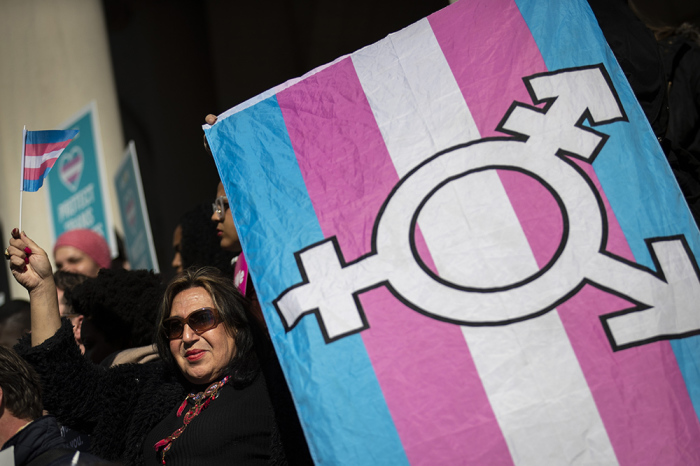America divided on whether greater acceptance of trans-identified individuals is good for society

As a fierce debate continues to rage over the participation of trans-identified athletes on sports teams that align with their stated gender identity, a newly released Pew Research Center study shows that Americans, in general, are divided on whether greater acceptance of trans-identified people is good for society.
The study, released Friday, was conducted as a part of a more extensive survey in July 2021. Pew Research Center asked 10,221 adults if “greater social acceptance” of trans-identified individuals is generally good or bad for American society.
Most respondents (61%) were either neutral on the issue or said greater acceptance of trans-identified people would be bad.
Thirty-two percent of those surveyed contended that greater acceptance of the trans-identified community in society would be “bad,” with 14% saying it would be “somewhat bad” and 18% saying it would be “very bad.”
Another 29% asserted that greater social acceptance would be “neither good nor bad.” Thirty-eight percent of respondents said it would be a good thing for society, with 23% saying it would be “very good” and 15% saying it would be “somewhat good.”
While Democrats were more likely than Republicans to support greater acceptance of trans-identified people in society, the study shows that there was no consensus in both parties on the issue.
Most Democrats (59%) see greater acceptance of trans-identified people as good for society. This support comes mainly from the most liberal faction of the group, where this position received 75% support.
When it comes to moderate or conservative Democrats, only 45% indicated support for greater acceptance of trans-identified people in society. On the other hand, 65% of conservative Republicans believe that acceptance of trans-identified people has been bad for society.
Beyond party lines, factors such as sex, age, education and race also seem to influence how people feel about the issue.
“Younger adults, Asian Americans, those with a bachelor’s degree or more education and women tend to be more likely to say social acceptance of transgender people is good for society. On the other side, White adults, older people, those without a bachelor’s degree and men tend to be more likely to say greater acceptance is bad for society,” Pew Research Center associate Anna Brown noted.
“Many of these differences remain, or become even more pronounced, within each party. Republicans and GOP leaners in all major demographic groups tend more toward saying greater social acceptance of transgender people has been bad, rather than good, but certain groups are more likely to say this than others.”
She pointed to “a majority of Republicans 50 and older” as the group most likely to express skepticism about “social acceptance of transgender people.”
By contrast, the study found that “about three-in-ten Republican adults younger than 30 say greater acceptance of people who are trans-identified is good for society, larger than the shares in older age groups who say the same.”
The release of the Pew survey comes as Lia Thomas, a biological male who now identifies as female, has attracted national attention and elicited passionate reactions across the political divide after setting records as part of the University of Pennsylvania women’s swimming team this season. Thomas had previously competed on the men’s swimming team at the Ivy League school.
While the Pew poll focused on the acceptance of trans-identified Americans in general, it did not touch on the contentious issue of whether biologically male trans-identified individuals should be allowed to compete in women's sports.
A poll conducted by Gallup last year found that a supermajority of Americans (62%) think that trans-identified athletes should only be allowed to play on sports teams that match their birth gender rather than their gender identity. At the same time, 34% of Americans believe that trans-identified athletes should have the right to play on sports teams that align with their gender identity.
Rep. Vicky Hartzler, R-Mo., one of several GOP candidates running for an open U.S. Senate seat in the state, released an ad Monday reacting to Thomas’ dominating performance on the women’s swimming team.
“I ran and coached girl’s track, and I won’t look away while woke liberals destroy women’s sports. Women’s Sports are for Women, not men pretending to be women,” she declared. “Some people are afraid to talk about it, not me.”
I ran and coached girl’s track, and I won’t look away while woke liberals destroy women’s sports.
— Vicky Hartzler (@VickyHartzlerMO) February 14, 2022
Women’s Sports are for Women, not men pretending to be women.
Some people are afraid to talk about it, not me. pic.twitter.com/mmwZFORJss
Critics of policies that allow trans-identified athletes to compete on teams that correspond with their gender identity, including some of Thomas’ teammates, point to biological differences between men and women as the reason for their opposition.
However, proponents of such policies, such as the ACLU, argue that biologically male trans-identified athletes don’t necessarily have a competitive advantage over biological females because “trans athletes vary in athletic ability.”





























